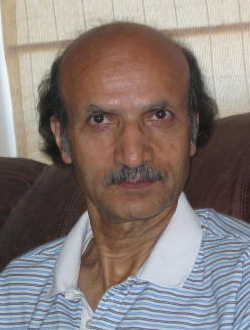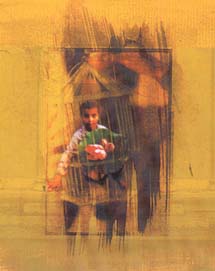K.L. Choudhary Of Gods, men and militants
By Dwarkanath Munshi
So much has been said , written, discussed and debated about Kashmir over the last decade and more that one might mistake this volume as one more of the same. But it takes just a casual first glance over the anthology of poems to realise that nothing could be farther from the truth. And as one proceeds one gets hooked to the narration which is straight, sincere and intense, raising poignant images before your eyes.

Picture that night, dark and still, and cold as never before. That silence was eerie, piercing like in a graveyard in the wilderness. The air was filled with foreboding. The instinct was ill at ease fearing the unseen and the unknown like ghosts around breathing and whispering and whistling. Then all of a sudden, doom descended . Some eighty thousand loud speakers came alive at a single blaring across the valley the first message of doom in stern and steady tone. “Leave your home O’ Kafir leave your young women behind and run for your life’’.
That night changed the world.
Kashmir can never get over that night-like a house burnt, a garden uprooted, a virgin defiled, a limb sundered, a friend betrayed. It can never be the same again.
uprooted, a virgin defiled, a limb sundered, a friend betrayed. It can never be the same again.
Time moves, mollifies, but the pain remains, and in a sensitive mind it grows. Dr. Chowdhary’s poems are the outpourings of that pain, that indelible impress which assails the author, from time to time, from place to place, and flows out through his pen. This has gone on for a whole ten years till he feels overwhelmed by nostalgia and is alternately hopeful and prayerful for return to his sacred loved soil of beauty and peace, brotherhood and cultural synthesis as it was and is no more
This is the essence of the Anthology, presented in three sections, each within its chronology. Thus you open with the Gathering Storm, move to the most heart rending and tragic phase of Exodus and Exile and conclude with the deep longing, in the third section, for return from rootlessness to Mother Kasheer.
Within this compass are the poems that spread before the reader the beauty and enchantment of Kashmir and alongside powerfully moving dirges on the tempests which have shaken our age, the desolation and destruction wrought by the mindless ‘jehadis’ and ‘fidayeen’ the terrorists who ironically are deluded to believe they are working for bringing the ‘Kingdom of Heaven’ down on earth.
The beauty and the pathos seize the reader from the very first poem. I quote:
‘’The mists dance around you lord Siva four seasons through......... ensconced on top of the Shankaracharya hill’’.
A few stanzas later ‘’The mists gently glide and slide as they deftly seek to hide the ravages .......... littering , Phelgam, excreta’’ and elsewhere again
‘’O where is the lingering mist that your feet did kiss where the cool breeze that fanned your brow’’.
Such quiet cries of anguish are eloquent in effect and even assume a shrillness by the nature of the trauma. Of bestiality at the Wandahama massacre of the whole Pandit population, the poet grieves with tearful irony: the occasion was the fanatics ‘ holy Shaba Qadar, of night long prayers for peace and piety. They marked it with butchering the entire 23 Pandit population-babies, men, women. Asks the poet with a bleeding heart- what drove the fanatics ‘’to pump eighteen bullets into the tender constitution of a tiny kid .........when a single would have done ‘’?
If it is pain and tears here, he gives vent to his deep anger in cutting satire are another place, when he describes the madness and misery of misanthropy and munificence in the inverse between the migrant and the militant in the following verses:
Here a migrant stands in a queue
in this blazing afternoon sun
for his monthly allocation-
three hundred and seventy five rupees
& kilo sugar..........
A few lines later:
And yonder in that prison
is detained a terrorist called militant
who receives four fifty a month,
milk mutton........
overseen and monitored
by human rights groups........
Asks his victim the migrant
why don’t I turn a Militant
If only for a better deal.
One can go on and on and find that the Anthology is not only scholastic but in the main it is a chronicle of human tragedy both on the part of the perpetrators and the victims. The human angle dominates at every point. It goes to the credit of the author who is an eminent physician and no poet by profession or training that he has written it all under an urge kindled within him, by the suddenly rapid and unforeseen transitions of human behaviour. It thus bears the stamp of spontaneity and freshness.
All through the Anthology he has sought and succeeded in avoiding the imitation of any style or language or versification. Whatever the quality of it, that is properly his own and is engaging. He has also not permitted the words to divert or diminish the attention of the reader from the original purpose or interest he has succeeded in creating. He has simply clothed his thoughts in what he thought was most appropriate language.
Having said that much about “Of Gods, Men and Militants’’ one feels like going beyond its limits with the hope that the excesses and insanity depicted in it are gradually yielding place to better sense and sanity.
The extreme madness which manifested itself on September 11 (2001) from the scene of the anthology, and on October 1 and December 13 last year, awoke the world at large to the barbarity of the demented soldiers of faith deluded by fundamentalists of fraud.
There appears a reflux of the tide. A ray of light is gaining ground and a feeling and belief is growing that whole generations of mankind ought not to be consigned to a hopeless inheritance of ignorance and misery and that a secure haven might emerge when the storms are exhausted and past. A volume of verses dedicated to that hope and happening would be a memorable reward to Dr. Chowdhary.



